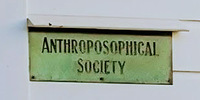The Twelve Human SensesTHE TWELVE HUMAN SENSES Introductory Talk #12, by Hans van Florenstein Mulder – some notes In lecture 7 and 8 of "The Foundations of Human Experience" or "the Study of the Human Being" Rudolf Steiner discusses the 12 senses. I like to remind ourselves of what I brought in our first talk of this series of 12 Introductory talks. As human beings we connect ourselves in a three-fold way to the objects of the outer world.
A sense organ is a physical /etheric organ of perception. A sense is an organ or attribute of the Experience body (Astral body) through which a stimulus of the outer world can awaken an inner perception. To give an example, A child laughs or cries
It is not the senses that deceive us but our judgement of the percepts. It was Rudolf Steiner who first proposed that there are twelve senses through which a stimulus from the outer world can awaken an inner perception within me. In this inner perception awakens the Ego or Self. *********************************** 12 Senses Our 12 senses are our windows to the outer world. These open gradually from early childhood to adult hood. 12 Ego 11 Thought Thinking Outer World Upper School World is true 10 Speech awake – conscious, objective 9 Hearing
8 Warmth 7 Sight (colour) Feeling Inner/Outer World Primary school World is beautiful 6 Taste dreamy – sub-conscious, like/dislike 5 Smell
4 Balance 3 Movement Willing Own Body Kindergarten World is good 2 Life, well being sleepy – unconscious, instinctive 1 Touch ********************************************************** Moon Nodes The path of the moon is at angle of 5 degrees to the ecliptic. They have two points in common, the so-called nodes when the moon moves from appearing above the sun’s path (ecliptic) crossing it to below and vice-versa. These two nodes rotate through the zodiac ecliptic every 18 years, 7 month and 9 days. On the day we are born, when we take our first breath, the moon node is in a particular position. After 18 years, 7 months, and 9 days the Moon node returns to its position at our birth. According to Rudolf Steiner these events, which could happen up to four/five times in the life of a person are significant in the karma of this person. 1st node return at 18y 7m 9d. Waking up; adventures and leaving home; choice of profession is made; meaning and seriousness of life. 2nd node return; 37y 2m 18d Many things come to an end; existential dilemma and deep doubt; the future looms uncertain; energy and enthusiasm ebb; teachers are tired, and artists lack inspiration. 3rd node return; 55y 9m 27d Ill health and major surgery; health becomes a problem; through trials newly found strength, conviction, and power. 4th node return; 74y 5m 6d Years of grace (retirement); memories intensify; new tasks; major works, or masterpieces or books written. 5th node return; 93y 0m 15d ??? ************************************** Karma or destiny Karma or destiny arises when on earth we meet the world, our environment consciously and become aware of oneself as a spiritual being. As educators and parents, we work with the threefold picture that the new born child' s destiny is determined by the Ego who descends into the child from the spiritual world, and the inherited characteristics from its biological parents giving the physical or biological body and the influence from the environment represented by the world, teachers and parents’ circumstances. While growing up the child's ego will slowly emerge and transform the inherited biological body to make it into the instrument the child needs to fulfil its destiny. We can differentiate karma into 3 categories. 1. personal karma 2. professional karma 3. karma of my country and people
In this talk we will only look at point 1: personal karma. This aspect can be differentiated into 2 parts. 1. The world. a. Where I was born - rural/urban; mountain/plain/oceanic; tropical/temperate/arctic; b. Who are my parents – heredity; education, motivation, social relationships; c. Cultural environment: language; wealth/poverty; class/strata d. Education system attended. 2. Myself a. my physical body: my size, gender, strengths, impairments, etc.; b. my etheric body: my temperament, how I feel about myself, my sense of well-being; c. my astral body: my gifts, talents and soul type; d. Ego: I can become conscious of my ego, of who “I am”, when I act.
Hans van Florenstein Mulder
Posted: Fri 04 Nov 2022 |
| © Copyright 2026 Anthroposophy in Hawkes Bay | Site map | Website World - Website Builder NZ |

